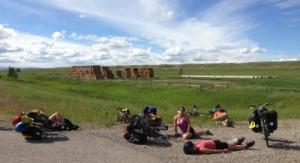Green architect Ed Gulick discusses the importance of factoring in humans’ need for comfort when installing alternative heating and cooling systems in homes and building. With the anger and frustration I felt at being subjected to a physically and mentally challenging situation, I realized there was an intimate connection with the level of comfort we hold so dear in this culture, and the lack of action toward climate change. When I reached the top of that hill and remembered how great it feels to push yourself, I decided to shift my attitude towards discomfort. Maybe as a culture we can do the same?
While acknowleging my privilege at having the time and means to take a month to cycle across Montana, gaining new perspectives on climate change and energy in this beautiful state, and building muscles along the way, I’m going to go ahead and say we in this country are far too comfortable. Without spewing statistics, the U.S. consumes far more energy than we proportionally should, and are setting an example and a standard for comfort that developing nations now strive for. Transportation and industry account for roughly half the energy used, with homes and buildings making up the other half. While I think improvements in efficiency and design, such as the ones being implemented by Ed Gulick, are a part of the solution to this climate crisis we face, I think the onus largely falls to us as individuals. I think one of the most basic things we can do is to consume less, and I suggest we begin by examining our standard of comfort.
As humans, our capacity for adaptation is astonishing and continues to blow my mind. We are capable of innovation we can’t even comprehend, and although we are hurdling toward a climate crisis, I believe that if we can develop immensely complex solutions for mitigating climate change such as geoengineering clouds and rainfall, we can certainly come to a much more simple solution. I propose that while we continue to pursue new technologies, we take steps in the other direction, and trust that comfort can be far more simple than huge homes and endless consumption. If everyone in this country can have an experience similar to cycling across Montana, I think more people may realize comfort can be found in putting on dry socks after a long, sweaty day, or that handful of granola when suffering from acute hanger (anger brought on by overwhelming hunger). I realize this is not the silver bullet to decreasing and reversing atmospheric CO2 levels, but when considering our consumption, I suggest we subject ourselves to more uncomfortable situations that allow us to appreciate the beautiful and simple things this world has to offer. I suggest shifting our attitude as I am attempting to do, and instead of getting angry from discomfort, embrace it and know that we are capable of living in a way that will allow the world to heal from environmental degradation.
– Kaya Juda-Nelson
One Reply to “Kaya Juda-Nelson: Embracing discomfort”
Comments are closed.

Kaya, I came across this article this morning when trying to find a video of your band. I appreciate both the point you’re making and your beautiful writing style. Challenging our notions of comfort and ways of achieving it invites all of us to make a difference on a daily basis. I love that you have brought it to my attention!